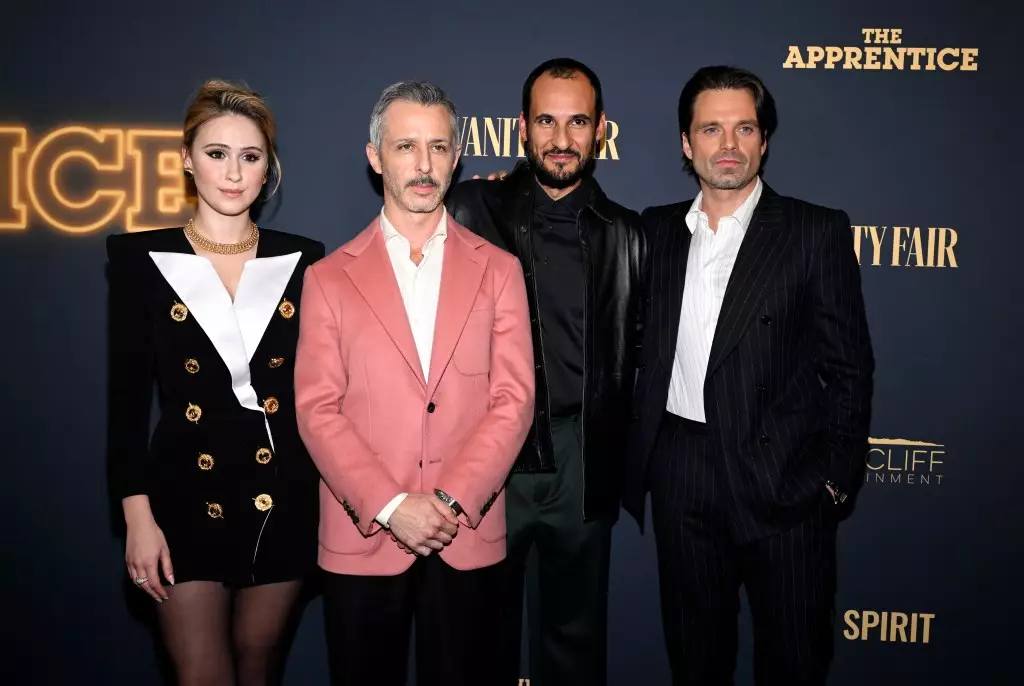The premiere of Ali Abassi’s film *The Apprentice*, centered around Donald Trump’s ascent in the world of real estate, was nothing short of a spectacle. James Shani, head of the distribution company Rich Spirit, expressed palpable excitement at the film’s New York premiere, held just before its anticipated nationwide release. However, the path to this moment was fraught with challenges that threatened to derail the project entirely. The journey of *The Apprentice* reflects not just the struggles of filmmaking but also sheds light on the complexities of navigating the intersection of art and politics in today’s landscape.
Gone are the days when filmmakers could expect smooth sailing in a socially charged climate. The film hit significant turbulence after Kinematics, a key financier often associated with Trump supporter Dan Snyder, decided to withdraw their support. This left the production in a precarious position, ensnared by legal threats as Trump’s legal team issued a vehement cease-and-desist letter aimed at stifling the film’s release. These pressures would have been enough to deter many in the industry, but the resolve of the filmmakers and their new ally, Tom Ortenberg from Briarcliff Entertainment, became a lifeline in a time of uncertainty.
*The Apprentice* made waves at prestigious film festivals—Cannes, Telluride, and TIFF—garnering a substantial amount of attention and critical acclaim along the way. However, the film’s subsequent limbo due to financial and legal entanglements paints a picture of the complex dynamics often present in Hollywood. The frustrations echoed by journalist and screenwriter Gabriel Sherman during this uncertain journey provide insight into the chaotic nature of film production, especially when political figures are involved. Sherman candidly described booking his own ticket to Telluride with no certainty of whether the film would even screen.
This narrative highlights not only the unpredictability intrinsic to the film world but also the mental toll it can take on those involved. Sherman stressed the necessity of managing expectations—a sentiment that resonates with many creators who face similar hurdles. The statement that many involved in the project had never experienced anything like it before reflects a disheartening reality: the entertainment industry can be a minefield, particularly when wading into contentious political waters.
Amidst the unfolding drama, filmmaker Ali Abassi offers a unique perspective on the political landscape that shaped *The Apprentice*. He defies the typical dichotomy of American politics, stating that he perceives individuals as complex human beings rather than fitting them into rigid party lines. This perspective manifests in the film’s portrayal of Trump, as played by Sebastian Stan—a character constructed with an intricate blend of personality traits that range from charm to narcissism.
This complex depiction aims to navigate the contradictions that characterize Trump’s persona. Abassi highlighted the film’s controversial elements, particularly a harrowing scene where Trump is depicted as committing sexual assault. This portrayal is grounded in documented realities—he referenced a deposition given by Ivana Trump that illustrates the problematic patterns in Trump’s behavior. By anchoring the film in real-life events, Abassi challenges the audience to confront uncomfortable truths about a figure who has dominated public discourse for years.
As *The Apprentice* embarks on its release journey, the film serves more than just entertainment; it acts as a reflection of societal anxieties regarding power, accountability, and the often-blurred lines between celebrity and reality. Shani’s remarks at the premiere underscore a troubling narrative: the reluctance of many to support projects that confront such contentious themes. This, he argues, signifies a cultural moment where bold artistic expression is met with apprehension in a polarized climate.
Abassi’s voice in this dialogue adds an essential layer of depth, pushing audiences to reconsider their understanding of personal identity within the political spectrum. By showcasing Trump’s vulnerabilities alongside his distinctively dangerous traits, the film seeks to portray a fuller picture of the man behind the headlines.
*The Apprentice* encapsulates a significant moment in cinematic history—one where the lines between art, politics, and public perception collide. With the film poised for wider release, its true impact remains to be seen, but the challenges it faced are indicative of a larger struggle within contemporary filmmaking: the need to maneuver through the intricacies of storytelling amid divisive political narratives. As audiences engage with *The Apprentice*, it is an invitation to reflect not only on the film itself but also on the stories we choose to tell and those we choose to silence.

